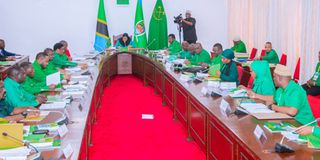Prime
Why CCM revised nomination timetable for parliamentary, councillor and representative aspirants

What you need to know:
- The previous schedule, released on 10 April 2025 by CCM Secretary for Ideology, Publicity and Training, Mr Amos Makalla, had set the nomination period from 1 to 15 May 2025.
Dar es Salaam. Chama Cha Mapinduzi (CCM) has revised its timetable for the collection and submission of nomination forms for parliamentary, councillor and House of Representatives aspirants ahead of the October 2025 General Election.
In a statement released early Wednesday, April 16, 2025, CCM Secretary General Dr Emmanuel Nchimbi said the decision to alter the schedule followed consultations with party members and extensive internal deliberations.
According to the new timetable, the nomination window will run from 28 June to 2 July 2025, closing at 4:00pm on the final day.
Forms for special parliamentary and House of Representatives seats will be issued through the regional offices of the party’s affiliated wings—UWT (Women’s Wing), UVCCM (Youth Wing), and the Parents Wing. Nomination forms for standard parliamentary and representative positions will be available at district CCM offices.
The previous schedule, released on 10 April 2025 by CCM Secretary for Ideology, Publicity and Training, Mr Amos Makalla, had set the nomination period from 1 to 15 May 2025.
The revised dates shorten the nomination exercise from 15 to 5 days and place the start of the process one day after President Samia Suluhu Hassan is scheduled to dissolve the 12th Parliament on 27 June 2025.
The announcement follows a series of high-level meetings chaired by Dr Nchimbi in Dodoma, including discussions with Prime Minister Kassim Majaliwa, who also chairs the CCM Parliamentary Caucus, and Speaker of the National Assembly Dr Tulia Ackson. The closed-door meeting, held on 11 April, was also attended by CCM Deputy Secretary General (Mainland) John Mongella.
On 14 April, Dr Nchimbi travelled to Zanzibar, where he met with CCM Vice Chairperson (Zanzibar) and President Dr Hussein Mwinyi at State House. Also in attendance were former Zanzibar President Dr Mohamed Shein and CCM Deputy Secretary General (Zanzibar) Dr Mohamed Said Dimwa.
While official details of the meetings were not released, a senior CCM official—speaking on condition of anonymity—told Mwananchi, a sister paper to The Citizen, that one reason for revising the timetable was to enable current MPs and representatives to focus on budget duties in Parliament.
“Had the original schedule of 1–15 May remained in place, Parliament would have been disrupted. MPs would be preoccupied with who had collected forms in their constituencies instead of focusing on the budget. That’s why it was shifted,” the source said.
Some political analysts had earlier characterised the initial timetable as a strategic move by CCM. A political analyst, Dr Faraja Kristomus, told Mwananchi that the early nomination period could have suppressed dissenting voices during the Budget Session.
“MPs may be reluctant to oppose government motions for fear of being disqualified during the primaries,” he noted.
Dr Kristomus also argued that the timing might have been intended to curb electoral corruption by ensuring aspirants enter the process before receiving severance payouts, thereby creating a more level playing field.
“It prevents a scenario where sitting MPs use their terminal benefits to influence internal party elections,” he said. “It also gives the party time to identify public servants intending to contest, and prepare for their replacements.”
A Historian from the University of Bonn in Germany, Philemon Mtoi, described the approach as a “trap” for incumbents, arguing that internal campaigns tend to favour those with financial muscle.
“Elections here are often viewed as income-generating opportunities. Those with money have an edge, while the poor may be edged out,” he said.
A political science lecturer at the University of Dar es Salaam, Dr Mohammed Bakari, linked the early primaries to a strategic response to Chadema’s “No Reforms, No Election” campaign.
“By starting early, CCM is signalling that elections will proceed regardless,” he said, warning that the revised schedule could heighten anxiety among MPs already facing competition before the dissolution of Parliament.
“Confidence levels will drop, and many will be distracted by speculation about who has picked up forms,” he added.
Nonetheless, he noted that early primaries could also enhance transparency, giving the public more time to evaluate candidates.
Dr Richard Mbunda, another political analyst, observed that although the exact dates for party primaries have yet to be released, the revised timetable allows sitting MPs to remain influential during the nomination phase.





